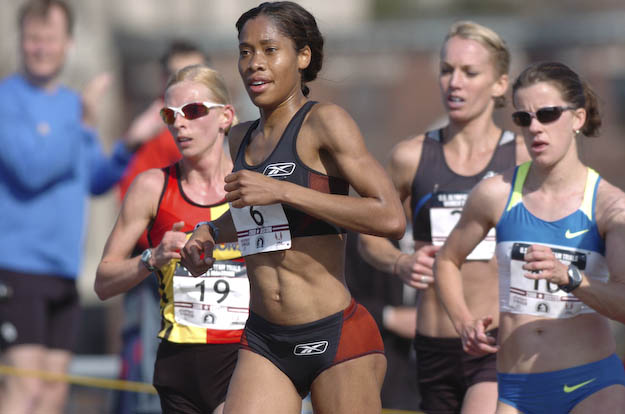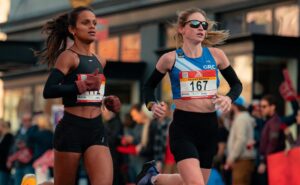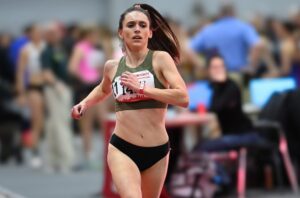
I recently wrote about Samia Akbar being the fastest known U.S.-born Black marathoner with her 2:34:14 at the 2006 New York City Marathon. Last week, I had the opportunity to have a conversation with her, and I’m sharing some of the highlights here. Akbar was an All-American runner for American University, and she was inducted into their athletic hall of fame in 2017. She went on to run professionally for seven years and now works as a global marketing manager for New Balance.
When you ran your 2:34:14 at the 2006 New York City Marathon, were you aware of it being the fastest time by a U.S.-born Black woman?
No. I was aware of it when Gary Corbitt mentioned it to me like two years ago. That’s definitely something I had thought of, because friends and family had asked me about it many times. I thought of it as a cool trivia question I should probably delve into some more, but I didn’t know who had held the fastest time before me.
To this day, why is 2:34 the PR for a Black woman born in the U.S.? I feel like the time should be faster and we should have progressed by now. I do feel like it’s only a matter of time [before that time comes down], but it bothers me. It’s not just Black runners, there’s not a lot of diversity across the board. The white women who occupy that space are awesome and deserving, but I definitely think it’s something to note and keep talking about, thinking about, and questioning, because it has not changed, which is problematic and sad.
Diversity is something that is important for everyone. What could we achieve if we were really firing with all pistons and including every part of our population to go forward and represent us?
Can you share some of your thoughts on getting more Black children running distances? Many people were accustomed to talking about how accessible running is, saying all you need is a pair of shoes and a safe place to run. But Ahmaud Arbery’s case has made it very clear how complicated the safety issue is, and how that’s a barrier to participation for some.
Growing up in the suburbs with a couple other Black friends, we all have stories about the police being called on us in our own neighborhoods, police officers going up to us or our siblings and asking, “What are you doing here?” when the answer was, “I’m walking to my house. I live here.” Even in a place like Northern Virginia, which feels pretty safe and people are really educated, I didn’t feel like I was running around amongst a bunch of confederate flags or something, but people were still very suspicious that my Black self was in this space that was predominantly white. So I think it’s a very complicated thing and I don’t know what the solve is to get more Black people involved in distance running, but what I do know for sure is that it’s going to be many things.
Maybe you need to make sure that you have a coach that takes you to a green space from a city space…I don’t know that everybody has access to that and the time or money to rent a van or take a carpool. There are so many things that I think about that could be barriers for some people.
It’s also a cultural thing. People should feel encouraged to try the longer distances. I was encouraged to try it because I started track with a friend who was a sprinter. I kept trying really hard to run fast at 200s and 400s in practice, and it was not panning out. I was game to keep moving up until I found a space where I was more successful. If you have kids coming out for track, that’s a great place to start. Just say, “Hey, it probably sucks to come in last in every 200m repeat, but I think you might like running more if you tried the mile or you had a leg on the 4x800m team.”
Being able to see yourself doing these things and understand what it takes to be a professional distance runner is also part of the hurdle with distance running. It’s not something that you see a lot on TV. But now, with social media, there’s a way to make it really fun. You can get a peek into this professional athlete’s life, it’s them telling their own story, talking about the things that they like to do, posting pictures of themselves.
On the Citius Mag podcast, Russell Dinkins recently talked about why it’s harder for track & field athletes to speak out about their experiences, because they have less job security compared to other types of professional athletes. More athletes have been speaking out in the last few weeks, and I’m curious what you think about all of it.
It’s been exciting to see Marielle Hall use her voice and write something, and seeing Alysia Montaño all over the place, having these conversations about women, being pregnant, and the sport. Hearing from Allyson Felix and Alysia, along with Kara Goucher, even if you don’t know running that well, you hear these people talking about a compelling and interesting topic that transcends sport in a way. That makes me really happy.
Seeing those athletes in Sports Illustrated talking about their experiences with racism is important because one thing that a lot of marketing people can tell you is that social justice is important to young people. In basketball, the players are able to have a voice and wear “I Can’t Breathe” shirts to practice. In the NFL, they’re having an interesting time now, but for a long time, they really tried to suppress progress, I believe. They were not rewarding people who were speaking out about what was going on around them. I think what’s happening lately in our sport is so cool because this is another way to attract people.
It’s so crazy that we’re just getting to this point in time, but if you take race out of whatever you’re doing, any human being connects with another human being because of their authenticity. And young people, especially, can tell when they’re full of it versus not. I think it’s really healthy and to our advantage that we’re having this dialog about inclusivity and diversity in our sport.
These things that people are talking about have been going on forever. If you’re Black, you deal with this no matter where you work, whether you’re a professional athlete or not. You deal with the precariousness of wanting to make change in your workplace or in your career and also feeling like you have to make sure that whatever you’re doing, you can create something positive without getting fired or being shunned by your coworkers.
It’s so exciting that there’s so much change happening. It feels like the Twilight Zone when you wake up and they’re like, ‘We’re going to remove Aunt Jemima and Uncle Ben from these products,” And you’re like, ‘That is great,” but there’s also that sick feeling you get because people have been telling [these companies] that this is inappropriate for a long time and…if it’s that easy, why weren’t they doing the right thing from the beginning?
While it’s really cool that people are speaking out and we’re getting more information that’s less watered down…Black people are constantly feeling like we need to edit ourselves, from the way we look, to the way we speak to people, to the things we say. We have to make determinations all day long with different groups of friends or co-workers about if I say this, will people really understand, are they really listening, will they really hear me, will they care?
Do you have other thoughts on what else we can do to get more Black kids running? How important is representation?
Representation matters so much…and it’s important to put people of color, Black women, men, on the cover [of magazines]. I definitely think that that’s like the first step. I’m sure this is the case in many Black families, but my parents were constantly telling us that we have to see it for ourselves, because if our expectation was to go out in the world and see Black men and women doing a full span of things in the world, that’s not reality, so you have to be able to see yourself doing it. But it would be really cool if we could see people doing this kind of stuff in film or in magazines or when people are making their ads and putting stuff together for social. Whatever that outward reflection is to your consumer, whatever industry you’re in, if you can show people being a part of the sport, that would be a really great start.
It’s going to take a lot. I don’t know that I have all the answers. I would love to be a part of some kind of conversation where people are thinking about how to get more kids involved. Also, it starts with talking to kids. Because I’m a marketer, doing your market research and thinking about what kids emotionally connect with.
I would hope that it doesn’t get reduced to some kids being able to get to an open green space to run for miles and miles in high school and then other kids can’t. I feel like we’ve got to be more creative than that.
Another part of it is making sure kids don’t feel like they’re not an other. When you do have kids trying the mile, the 5K, the 10K, racism and snide remarks [can’t be the] thing that makes this kid think, “I should just try the 400m or 500m again.” That’s probably just an ongoing conversation, making sure that people feel welcome and know that the events are for everybody. Anybody can run the 200m and anybody is welcome to try the two-mile in high school.
I spent a lot of time being the only Black person doing all kinds of things when I was growing up. I had a wide range of experiences with people being extremely welcoming, and having this warm running community full of people that are thoughtful and really smart and go on to do all kinds of cool things after running. And also people that said things to me that were really hurtful because I was Black and I didn’t fit in their box, and they didn’t understand why I was there or why I was trying to have a professional career after college.
It’s tough for anyone, other than the very top runners, to make it as a professional runner, but did you feel like there were additional barriers there, as a Black woman?
It’s a hard career, because we’re in a sport that’s not football, baseball, and basketball, so there’s just a totally different setup for the sport itself, in the way that the governing bodies manage athletes. I didn’t have an enormous contract, but I had what I felt like, and still feel like, was a solid contract at the time. I was able to have a career running mostly and I wasn’t constantly stressed about money. I did live at home with my parents most of the time, but I was also traveling a lot…
One of the things I think about is Black people in America and their wealth. There are a lot of studies about people who earn college and graduate degrees not only making sure they can sustain themselves, but also helping family members. It’s like a web where everybody’s lifting up the next person. When you come from a family where they’re helping you put down for an apartment or a starter home, you find yourself in a different scenario as far as having a career and being able to financially move through life with a little bit more ease. I didn’t necessarily have that issue for myself, but it is something to think about if we’re talking about Black people and people of color.
If it’s Samia, the Black woman speaking, I definitely noticed the kinds of questions they asked women, and also the questions that they asked me, being a Black woman with the last name Akbar. There was definitely this weird undertone, sometimes, of being an other. Like, “Where are you really from?” And I can’t tell you how many times people have asked if English is my first language.
I can’t tell you how many times I was asked, near the middle to end of my career, if I was thinking of having a family or if I was married. And having male journalists tell me it would be an advantage if I had a kid. I remember [talking to] one guy straight one day and saying, “Have you ever talked to Marla Runyan about what it’s like to have kids? It sounds really hard.” [Meanwhile] some man who is a running nerd is thinking about and reading about a weird genetic boost. It doesn’t really have the same practical effect, if you actually talk to women. I think there were just a lot of people who hadn’t met somebody like me, because I was a first and only, so I feel like I got a lot of weird questions.
I definitely feel like people didn’t even think I spoke English some of the time, so people wouldn’t bother to talk to me about things. It bothered me a little bit, but I also feel like it created a safe space because the less crazy conversations you’re having, the more you can just focus on the things that are important, which was my running career, and the fulfillment that I was getting out of participating in a sport that I really loved. And doing all the cool things that come with it, like being able to travel, and make new friends, and push my body, and just having a lot of self-reliance, inner strength, and mental focus.
I feel like I’ve spent so much time not really talking about this kind of stuff until now with folks, because I don’t want it to take away from all of the things that I’m so grateful for. Running and my family have given me so much. But [how she was treated] because of who I am, that has also stuck with me. It’s made me tough, too… I didn’t necessarily think that it held me back, but I have to think, now that we’re chatting about this, how could it not? If people are constantly thinking that deep down, Samia Akbar is a Moroccan. I’m going to keep pressing her and she’s going to tell me that her mom is actually from [somewhere else]. It really wasn’t my problem, but for those people that really cared to ask and really just had to know, it was clearly a barrier for them in really connecting with me or seeing me as somebody who represented them in the United States of America.
It can be a hard question to answer because sometimes the microaggressions and white centering are so subtle that no one can prove it. My hope, as we’re having these conversations, is that some of these things are going to change.
That’s definitely how it works, and I agree that things are so subtle. As we were saying earlier, things haven’t changed. The things that you would like and the conversations we should be having, that standard has never changed, just because all of a sudden, it’s occurred to a whole industry that they should care about a whole plethora of issues.
I really hope that that happens, and I think, depending on the industry, it will. In footwear, people are wanting to appeal to as many consumers as possible in business. If they’re smart, then this is not only the right thing to do, to think about diversity and to care, it’s also the smartest thing to do from a business sense. It’s pretty straightforward.
People had to get mad and companies had to feel like there was something at stake, something to lose, to actually do something. That’s pretty bad, but I’m with you, hopefully this sparks the change.
I think that leadership needs to change in the sport, because we need people to be thinking about this from a lot of different angles. You can’t have one kind of person making the decisions in any sport, or any endeavor, or any business and think that you’re going to get an authentic, correct, or fresh way to address an issue.
I think you need people who are willing to talk about these things and make them a priority and actively try to sign people and give them reasonable contracts where they can make a living and not feel like they have to hustle and do 15 other things. Give them a really good start so they can see if they can progress under the best circumstances, not under $10,000 a year and good luck with your life. And, “Oh, you didn’t perform? Well we gave you a few years of that and it’s over.”
I know money doesn’t grow on trees and it’s a whole business thing, but if you want to try and see if this could work, if people can do their best, you should probably really give them a fighting chance. You should probably not cut them if they’ve been an amazing athlete for you for years and years, they’ve made it to the Olympics, and they have a baby and want to continue to run. You should probably think about that.
Your former high school, college, and post-collegiate teammate Keira D’Amato just ran 15:04 for a 5,000m time trial at age 35. Did that make you want to dust off your spikes, get out there, and see what you can do?
I definitely felt an extra zing and zip on my run that day. I’m so excited for Keira. We’ve known each other for such a long time that it’s pretty emotional for me to watch this journey that she’s on. Because she’s my sister, she’s my good friend, it just makes my heart soar.
There are so many things that women feel, and people feel, like they should do in a specific order. The running side of me is like that’s freaking incredible, you put yourself in the archives amongst this amazing list of women, at this age, that have done this thing. And then, on the life side, and the friend side, I’m so proud of her. This is what running is about, as far as being an individual sport. This is all Keira. All these things were inside of her all along. She had the right timing and the determination to really make so much of this happen
She’s living her life as a mom, a wife, a family member of a close family, she’s always there for people, and she’s just awesome. I’m so proud of her for thinking, “I care about doing this and I want to try this, so I’m gonna do it.” I feel like women get so many messages to not do that…
I believe that she’s going to break 15:00. I can’t wait until races start bumping back up, because I know that it’s going to happen. Keira is so fast and she always has been. I think she can do whatever she wants in the marathon, but I really think that this 5,000m/10,000m space for her is going to be the best, and she’s just getting started. I think that the strength that she gained from that marathon training is really showing up now.
I got emotional a little bit earlier thinking about some of the things that I kind of tried to not think about during my running career, being a Black woman, but I’m also getting choked up talking about Keira now because it’s just pretty incredible. I’m just really proud of her. I’m really happy for her. And she deserves to just have fun and continue to do whatever she wants to do. It’s so cool.






